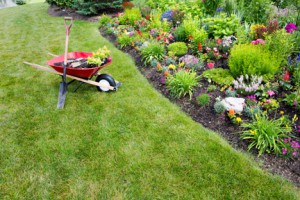A beautiful lawn has a hard life. Every summer sees it suffer from the stresses of wandering feet, periods of hot weather and a number of diseases that can strike even the best cared-for lawns.
Here is some information on the most common lawn problems and what you can do about them:
Weeds
Weeds such as dandelions, thistles, clover and weed grasses are one of the most common lawn problems. Large numbers of weeds are normally an indication of a lawn suffering from poor nutrient levels. Sensitive lawn grasses require more nutrients than weeds, which is why weeds spread at the expense of grass in poor quality soils. Low rainfall during the summer months exacerbates the situation, as lawn grasses are far more susceptible to a lack of water than sturdier weeds. Fertilizer is the ideal solution in such cases. Frequent mowing at a high cutting height acts as an additional defense against the growth of weeds by preventing access to the light needed for germination. Using good-quality seed is also a factor that should not be overlooked. Cheap seed often contains a certain proportion of weed seeds and is cultivated to promote rapid growth, having an effect on grass density. Carrying out regular and deep scarifying is an effective method of preventing weeds from invading in the first place. Digging weeds out which have taken hold remains the best and often only solution.
Moss
Moss is a major headache for any lawn enthusiast. Moss will only move in where the lawn has retreated – it will not displace healthy grass. Approaches that destroy the moss alone will therefore not provide a lasting solution. Cutting weak lawn grass too short provides the ideal conditions for moss to thrive; these conditions can be combated by raising the cutting height and ensuring sufficient fertilization. Damp soils in shaded areas, such as under trees, must be improved, which generally means re-sowing with a good grass seed mixture and targeted fertilization. Moss will also flourish in over-acidic soils that are often characterized by water-logged, compacted ground conditions with an absence of air. Improved drainage will help rectify these conditions.
Fungal diseases
Fungi are yet another scourge of a well-kept lawn and affect its appearance. There are many types of fungi that can infect lawns, but only a few are really damaging. The following conditions help promote the growth of fungi:
- Extremely compact turf
- Thick lawn thatch
- High humidity
- Incorrect pH
- Over fertilization
- Thick layer of leaves in winter
A well-kept and healthy lawn is the ideal defense against fungal diseases. Where fungi do occur, the best solution is to seek out the services of a lawncare specialist.
Discoloration
Yellow spots in a rich sea of green is often a gardening enthusiast’s nightmare. Discoloration such as this can have a number of causes. Here, we have put together some tips regarding the most common problems.
Yellow spots in lawns
Yellow tips and pale green grass indicate a deficiency in iron and nitrogen. Such spots can be removed by direct application of an iron fertilizer. An improvement is normally noticeable within just a few days.
Speckled grass in combination with water accumulation
Rainwater that fails to seep away properly and grass that appears speckled with color are hallmarks of excessively compacted ground. Fungal infection and cyanobacteria are often unsightly consequences. The ground has to be broken up and loosened to allow the excess water to drain away.
Speckled discoloration after winter
Spots and mildew are unwelcome side effects of the onset of winter. To prevent their appearance, lawns should be fertilized in August or September to improve resistance. With a combination of an application of lime in September or October and increasing the cutting height, your lawn will be left better prepared to see out the winter months.
Sourced from STIHL



